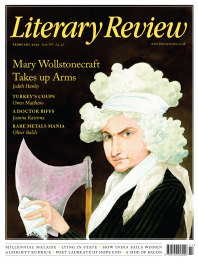Juliet Hindell
Memories of Edo
Stranger in the Shogun’s City: A Woman’s Life in Nineteenth-Century Japan
By Amy Stanley
Chatto & Windus 352pp £16.99
The Japanese: A History in Twenty Lives
By Christopher Harding
Allen Lane 528pp £25
Finding the Heart Sutra: Guided by a Magician, an Art Collector, and Buddhist Sages from Tibet to Japan
By Alex Kerr
Allen Lane 304pp £16.99
During the second half of the 20th century, much of the West’s idea of Japan was based on the anthropologist Ruth Benedict’s book The Chrysanthemum and the Sword, first published in 1946. Researched from a distance through articles and interviews with Japanese living in the United States, it was written to help Americans navigate and understand the country they ended up occupying for seven years following the Second World War. Although the book was roundly criticised for its research methods and some of its conclusions, it is still widely read by visitors of every type to Japan and is credited by some in Japan for inspiring a genre of home-grown writing known as Nihonjinron – theories on Japanese identity. In 2020, we might have seen modern Japanese identity on full display during the Tokyo Olympics, now postponed until this summer (with any luck). As we wait to see how Japan will present itself on the world stage, three new books by foreigners reveal very different aspects of the country’s identity in refreshing and surprising ways.
Among my many treasured souvenirs from eight years spent living in Japan is a tiny 19th-century pouch of faded indigo cotton containing a tortoiseshell hairpin and a lacquer comb inlaid with abalone – a find at a provincial flea market. As I read Amy Stanley’s Stranger in the Shogun’s City,

Sign Up to our newsletter
Receive free articles, highlights from the archive, news, details of prizes, and much more.@Lit_Review
Follow Literary Review on Twitter
Twitter Feed
The era of dollar dominance might be coming to an end. But if not the dollar, which currency will be the backbone of the global economic system?
@HowardJDavies weighs up the alternatives.
Howard Davies - Greenbacks Down, First Editions Up
Howard Davies: Greenbacks Down, First Editions Up - Our Dollar, Your Problem: An Insider’s View of Seven Turbulent...
literaryreview.co.uk
Johannes Gutenberg cut corners at every turn when putting together his bible. How, then, did his creation achieve such renown?
@JosephHone_ investigates.
Joseph Hone - Start the Presses!
Joseph Hone: Start the Presses! - Johannes Gutenberg: A Biography in Books by Eric Marshall White
literaryreview.co.uk
Convinced of her own brilliance, Gertrude Stein wished to be ‘as popular as Gilbert and Sullivan’ and laboured tirelessly to ensure that her celebrity would outlive her.
@sophieolive examines the real Stein.
Sophie Oliver - The Once & Future Genius
Sophie Oliver: The Once & Future Genius - Gertrude Stein: An Afterlife by Francesca Wade
literaryreview.co.uk